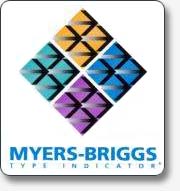
MBTI Step I
 The
Myers-Briggs Type Indicator (MBTI) is a psychometric
questionnaire designed to measure psychological preferences in how
people perceive the world and make decisions.
The
Myers-Briggs Type Indicator (MBTI) is a psychometric
questionnaire designed to measure psychological preferences in how
people perceive the world and make decisions.
For more than 50 years, the MBTI® has helped millions of individuals
throughout the world gain a deeper understanding of themselves and
how they interact with others.
The MBTI instrument helps people
transform themselves—by giving them a powerful tool for
understanding and improving how they communicate, learn, and work.
Through completion of the MBTI questionnaire (`reported type') and a
personal feedback session (including `self-assessed type') an
individual's unique personal type, with associated characteristics,
will be revealed.
MBTI measures
the preferences that we have within our personalities and the
strengths of those preferences. It produces a picture of each
individual’s set of personality preferences across four scales.
These are:
-
Extraversion-Introversion – how each of us is energised
-
Sensing-Intuition – what each of us pays attention to
-
Thinking-Feeling – how we conclude and take decisions
-
Judging-Perceiving – what kind of lifestyle we prefer
The purpose
of the Myers-Briggs Type Indicator® (MBTI)
is to make the theory of psychological types described by C. G. Jung
(1921/1971) understandable and useful in people's lives.
The essence of the
theory
is that much seemingly random variation in the behaviour is actually
quite orderly and consistent, being due to basic differences in the
ways individuals prefer
to perceive and reach conclusions.
If people differ
systematically in what they perceive and in how they reach
conclusions, then it is only reasonable for them to differ
correspondingly in their interests, reactions, values, motivations,
and skills. This has naturally big implications in areas like:
leadership, teamwork, communication, choice of career, conflict
management, coping with organisational changes and stress.
The MBTI instrument’s wide-ranging applications
promote growth and development in many organizational settings,
including business, coaching & counselling, and education.
Subsequent applications include team roles and development,
education and career counseling, management and leadership
development, coping with organizational change, dealing with stress
and understanding emotional intelligence
Applications
The MBTI Instrument can be applied to business, educational, career
guidance and counselling settings. It has broad practical
applications including:
Developing Leadership Potential
Self-awareness is fundamental to good leadership. An understanding
of the impact that personal style has on people’s motivation and
commitment is essential. The MBTI instrument helps managers assess
their strengths and development needs, their preferred style of
problem-solving and also how their style relates to that of others.
Developing Effective Teams.
We make the MBTI meaningful to you and your team in a practical,
engaging an interactive way. Our experiential and activity based
approach to the MBTI uses the personal insights gained from this
classic personality type indicator coupled with eye-opening and
engaging activities to yield powerful new understandings at the
individual and team levels.
By integrating
exciting and interactive challenges into the Myers-Briggs workshop,
we creates opportunities for teams to experience
type in action - generating greater understanding and new insights
into the team’s variety of human complexity and potential.
Myers-Briggs Type Indicator (MBTI) is an indispensable tool for
pulling work teams together and creating better understanding of how
to take advantage of the resources of the team, utilizing the power
of synergy and release the full team potential
Using our
experiential approach teams can practise,
reflect and evaluate on their strengths and development needs
and also clarify biases in their working
practices.
teams are furthermore introduced to the Team compass.
The Team Compass is dynamic and practical and a very effective and
insightful tool designed to visualize the connection of the members
of a team, i.e. how the individual members supplement each other in
a process of working or decision-making.
Managing Change
Individuals with different type preferences tend to experience
change and the process of transition in quite different ways.
Building awareness of these different reactions can help managers
and organisations support their staff and themselves through
organisational change.
Improving Communication and Teaching Methods
The instrument can be used to help communicate better with people of
different types, and to analyse and improve teaching methods. It
provides a framework for understanding differences in learning
styles and for creating learning situations which will appeal to
different types.
Problem-Solving
The questionnaire gives an insight into potential strengths and
blind-spots in problem-solving, encouraging individuals and groups
to improve the depth and breadth of their analyses.
Counselling and Resolving Conflict
The instrument is very helpful in self-evaluation, explicitly
emphasising the positive contribution that each type can make. It
can also help in dealing with conflict in relationships as it
focuses on valuing differences between people and improving
understanding and co-operation.
Team compass
Through
MBTI Teamcompass puts emphasis on team members'
individual differences and personal resources available in the team.
Through Teamcompass combined individual resources with different
roles and functions that are essential to the team goals.
Information concerned
Teamcompass - click here.
Discover some inspiring hours focusing on the
MBTI - click here
We also organize various lectures and courses on MBTI - click here.
Contact us for further information and inspiration - click here: Nymand and Vogelius
® Myers-Briggs Type Indicator and MBTI are registered trademarks of
the Myers-Briggs Type Indicator Trust. OPP Limited is licensed to
use the trade marks in Europe.